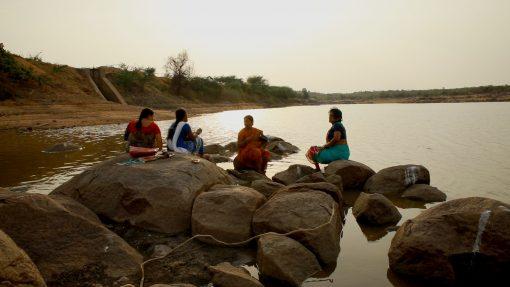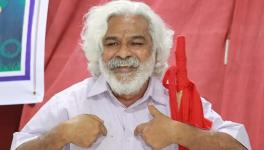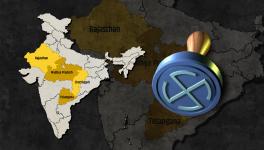These Roots are set Deep in the Land

Image Courtesy: Aditi Maddali
How do you locate oral traditions in their histories? What is the context that they are born out of? What are the politics of how we remember them? These are the questions that led to the making of Telugu film Songs of our Soil (2019). Aditi Maddali’s film uncovers the scarcely recorded history of uyyala songs, sung in fields across present-day Telangana.
The uyyala songs, she tells the Indian Cultural Forum, are responses to the immediate context: a gathering; to a goddess; but most often sung during long hours spent on the fields. They seem to be sung only by women. Unsurprisingly, these songs have become a means of mobilisation. They were sung during the time of the Telangana People’s Movement. Today, of the many situations they have been sung in, one of the most gripping is in protest of the Mallanasagar Dam Project.
In 2016 the land acquisition process for the Mallannasagar reservoir under the Kaleshwaram Lift Irrigation Project was underway. The Kaleshwaram project was supposed to be the largest of its kind in the world. The capacity of the Mallanasagar Dam alone was to be 51 thousand million cubic feet of water, leading to the eviction of eight villages and submerging 20,079 acres of land. The scale of this displacement and more which would be caused by the whole of the Kaleshwaram Project caused 30,000 villagers to protest against it.
Also read: Liberating the Sitas of India
Aditi’s film belongs to many of these women who joined in the protest. The women tell their reasons for their anger. They walk you through their homes, the fields and their lives. The compensation for their land is poor. “Where will we get such irrigable land for that kind of money?” “What will happen to the [landless] labourers who depend on these lands for their livelihoods, when these same lands are underwater?” Here there is a place for the camaraderie of women. “Will we also get a courtyard to sit together like this?” “What is the point of protesting? The documents to the land are in the men’s names. When they get together to drink they convince each other to sell the land.” Despite this, the women did go to the protests. They talk matter-of-factly about police brutality. Smilingly, Lakshmi, a villager from Vemulaghat says “they did their duty, we did ours”. Their uyyala songs even scold KCR — as Chief Minister K Chandrashekar Rao is popularly called — by name.
Songs of the Soil also features the women who come to work on the paddy fields in Telangana. They sing while they replant the paddy saplings and talk to the camera when they take their lunch break. They tell you how [privileged] others wouldn’t survive working those hours in the burning sun. They’re strong-willed old women who tell you they find their peace with each other, in their songs.
As Aditi points out, the ability of the uyyala songs to become a means of political mobilisation sits within the larger history of “work songs”. The political power of work songs as resistance many know through the songs sung by African-American slaves forced to work gruelling hours on plantations.
I asked the filmmaker if there has been a deliberate attempt to deny the uyyala songs their place in history. “It’s not as clean as erasure,” she replied. “What we need to look at is how so much gets clubbed under folk culture. Doing that means you are not even attempting to locate these traditions historically. You’re not attempting to look at how they play a role in women’s political articulation or even everyday articulation. When it is clubbed under folk culture you’re removing the songs from their roots.”
These roots are set deeply in the land. The tradition passed down from one generation of women to the next, songs carried from one field to the next or one gathering to the next. They are fluid. “There is no guarantee that the same song will be sung in the same manner the next time. There is no guarantee that it will even be passed on. Some version of it will be though” says Aditi.
As these songs are woven together at the moment, they draw upon their own lives for material. The singers tell stories from their lives, sing of their goddesses or express their feelings about a specific situation. This is how the anger against the Mallansagar Dam and the KCR government flows so easily into their songs.
During the many screenings the film has had, it has elicited a range of responses. The most outlandish of them was when a film festival organiser told Aditi that there had been complaints from men. They’d found it uncomfortable to sit through a film in which there was no male figure at all. The women to their dismay had not even been angry or crying or performing victimhood. They laugh, they sing, they talk about the local political situation regarding the dam, they work and they tell their stories. The filmmaker laughs as she recounts this to me, glad that her film caused such discomfort.
Aditi Maddali spent three years in research and in making the film. After more than a year spent on research and trying to find funding, a grant from India Foundation for the Arts (IFA) helped her in completing her debut film.
Get the latest reports & analysis with people's perspective on Protests, movements & deep analytical videos, discussions of the current affairs in your Telegram app. Subscribe to NewsClick's Telegram channel & get Real-Time updates on stories, as they get published on our website.
























